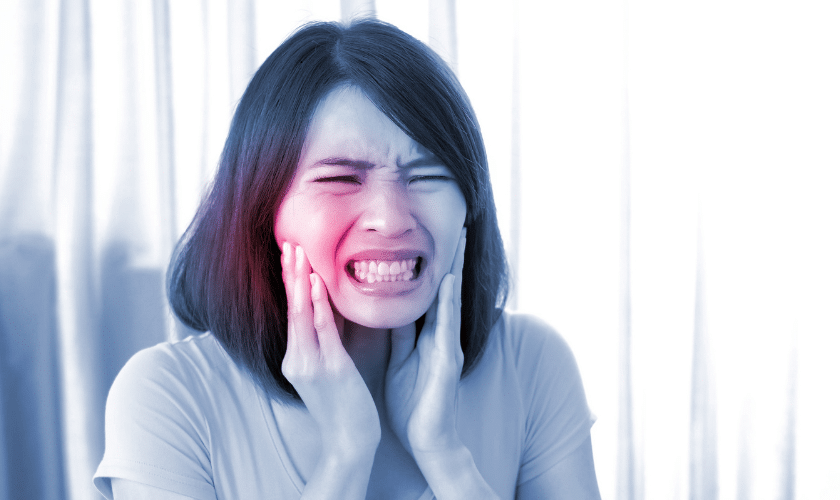Published on July 9, 2024

Have you ever experienced a nagging headache that just wouldn’t go away, only to realize it started with a toothache?
Many people don’t realize the close connection between dental health and overall well-being. When your tooth throbs with pain, it can send shockwaves through your head, causing persistent headaches. This link becomes even more apparent with abscessed teeth, which can trigger severe discomfort and pain.
An abscessed tooth isn’t just a minor inconvenience. It can lead to intense pain that spreads from your jaw to your head. Understanding how a toothache can cause a headache helps you recognize the signs and seek timely treatment.
Let’s dive into the connection between toothaches and headaches, focusing on abscessed tooth pain, and explore effective ways to manage and prevent this discomfort. Whether you’re dealing with a mild toothache or severe abscess pain, this guide will provide you with the knowledge and tools to find relief and maintain your overall health.
How a Toothache Can Lead to a Headache?
When you have a toothache, the pain can radiate to different parts of your head. This happens because the nerves in your teeth are connected to the nerves in your head. When a tooth becomes infected or damaged, it sends pain signals through these interconnected nerves. This often results in a headache.
The Pathway of Pain
- Trigeminal Nerve: The primary nerve connecting your teeth and head. It carries sensory information from your face and mouth to your brain.
- Pain Signals: When a tooth is damaged, pain signals travel through the trigeminal nerve to your brain, causing a headache.
Recognizing the Connection
- Symptom Overlap: Both toothaches and headaches can cause throbbing, sharp, or dull pain.
- Misdiagnosis Risk: It’s easy to mistake a headache for other issues, such as migraines, when it originates from a dental problem.
Symptoms of an Abscessed Tooth
An abscessed tooth causes more than just a toothache. It can lead to a variety of symptoms, each indicating the severity of the infection. Recognizing these symptoms early can help prevent further complications.
Common Symptoms
- Severe Toothache: Persistent, throbbing pain that can extend to the jawbone, neck, or ear.
- Swelling: Swollen gums or cheeks around the affected tooth.
- Sensitivity: Increased sensitivity to hot and cold temperatures.
Advanced Symptoms
- Fever: Indicates the body’s response to infection.
- Bad Taste in Mouth: Resulting from pus drainage.
- Swollen Lymph Nodes: Swelling in the neck or under the jaw.
The Impact of an Abscessed Tooth on Your Health
An abscessed tooth isn’t just a dental issue; it can significantly impact your overall health. The infection can spread to other parts of your body if left untreated, leading to serious health complications.
Potential Health Risks
- Spread of Infection: Bacteria from an abscess can enter your bloodstream, leading to sepsis.
- Sinus Infections: Infections from upper teeth can spread to your sinuses, causing sinusitis.
- Bone Loss: Prolonged infection can lead to the deterioration of the jawbone.
Preventive Measures
- Regular Dental Check-Ups: Early detection and treatment of dental issues can prevent abscesses.
- Good Oral Hygiene: Brushing and flossing regularly to maintain oral health.
- Healthy Diet: Avoiding sugary foods that contribute to tooth decay.
Treatment Options for Abscessed Teeth
Treating an abscessed tooth promptly can alleviate pain and prevent further health issues. Various treatment options are available, depending on the severity of the infection and the condition of the tooth.
Common Treatments
- Antibiotics: Used to clear up the infection.
- Drainage: Draining the abscess to remove pus and reduce pressure.
- Root Canal: Cleaning the infected pulp from the tooth and sealing it.
In Severe Cases
- Tooth Extraction: Removing the tooth if it cannot be saved.
- Surgery: More complex procedures to remove the infected tissue and repair the damage.
Preventing Toothaches and Abscesses
Preventing toothaches and abscesses starts with good oral hygiene and regular dental visits. Taking proactive steps can help you avoid the pain and complications associated with dental issues.
Daily Oral Care
- Brushing: Brush at least twice a day with fluoride toothpaste.
- Flossing: Floss daily to remove plaque and food particles between teeth.
- Mouthwash: Use an antibacterial mouthwash to kill bacteria.
Lifestyle Choices
- Healthy Diet: Eat a balanced diet and limit sugary snacks and drinks.
- Avoid Tobacco: Tobacco products can increase the risk of gum disease and tooth decay.
- Regular Check-Ups: Visit your dentist regularly for cleanings and examinations.
When to See a Dentist?
Knowing when to seek professional help is crucial in managing toothaches and preventing complications. Prompt dental care can make a significant difference in your oral and overall health.
Signs You Need Immediate Dental Care
- Severe Pain: Persistent or severe toothache that doesn’t improve.
- Swelling: Noticeable swelling in your gums, face, or neck.
- Fever: Accompanied by dental pain, indicating infection.
Finding the Right Dentist
- Search for a dentist near you online: Look for reviews and recommendations to find a reliable dentist.
- Consultations: Schedule a consultation to discuss your symptoms and treatment options.
Understanding the link between toothaches and headaches is crucial for managing pain and maintaining overall health. Recognizing symptoms of an abscessed tooth and seeking prompt treatment can prevent serious complications. Good oral hygiene, regular dental visits, and knowing when to see a dentist are key to preventing these issues. Stay proactive in your dental care to ensure a healthy, pain-free life.
